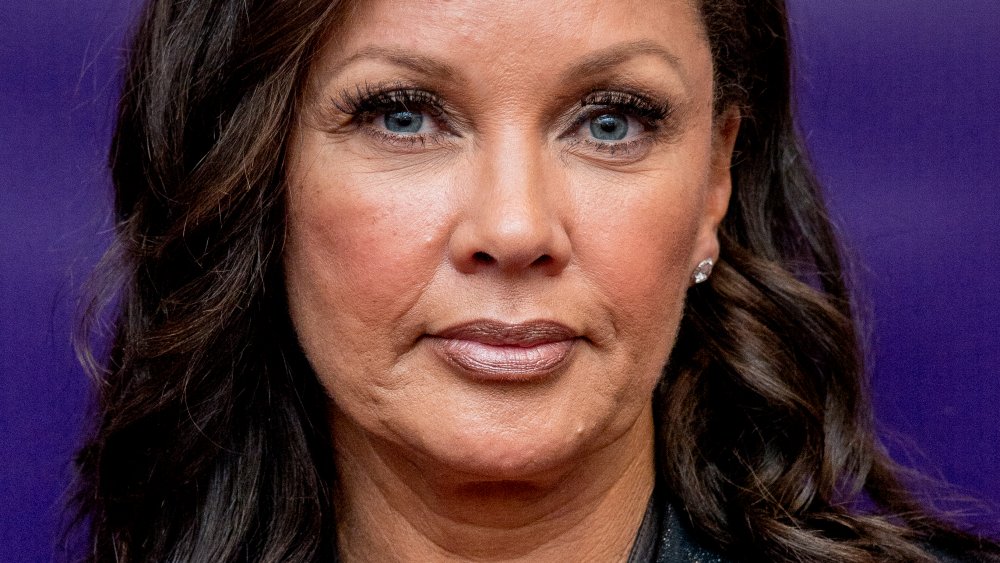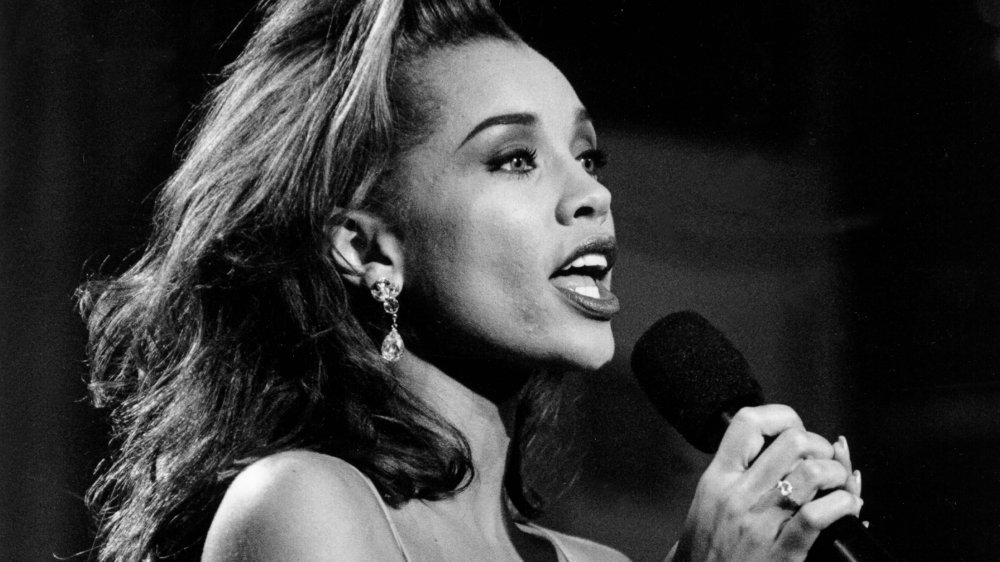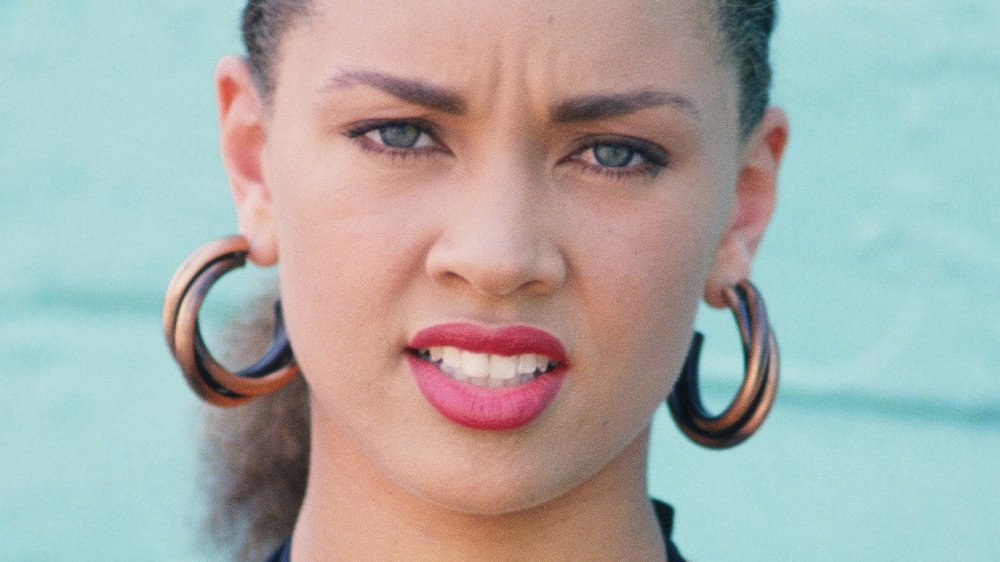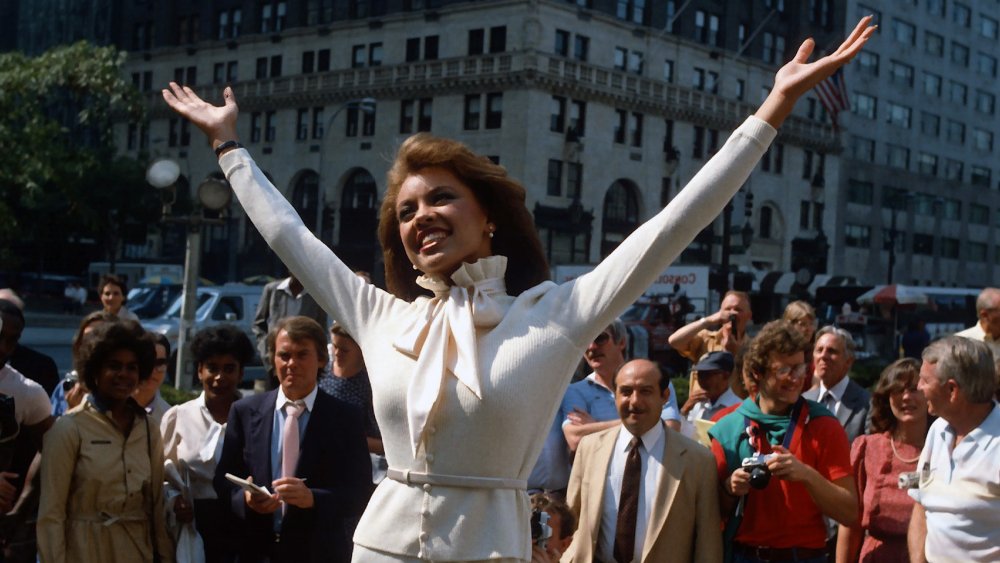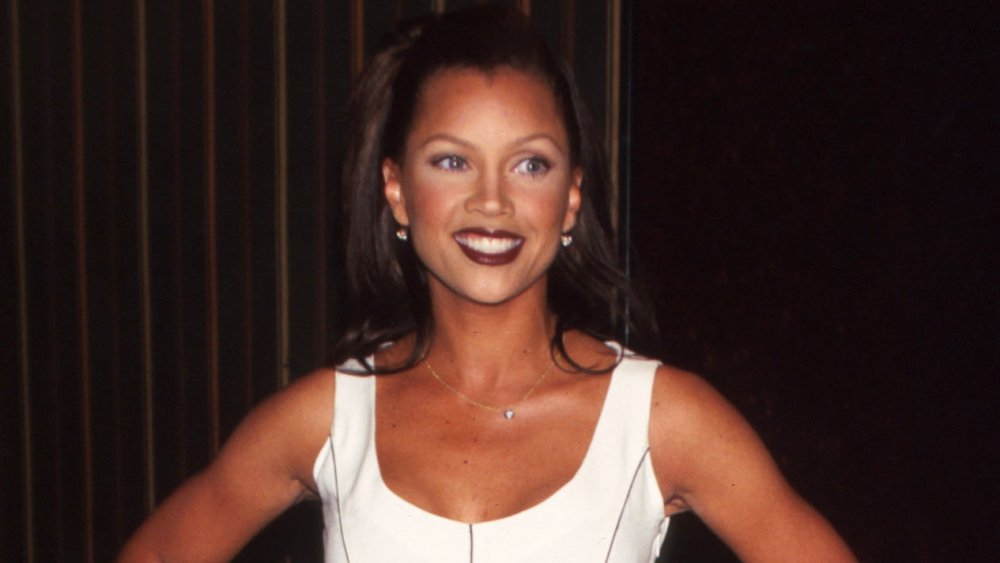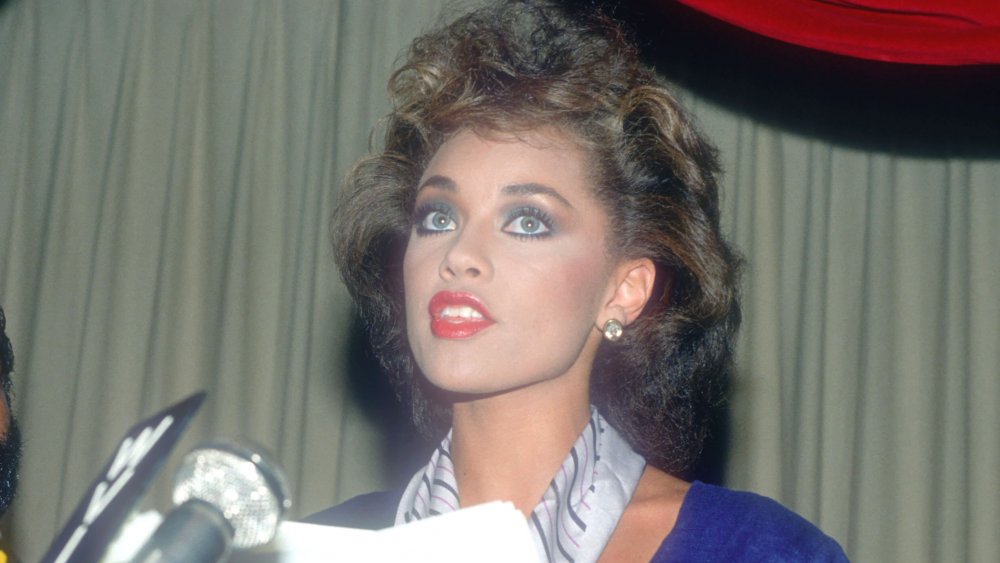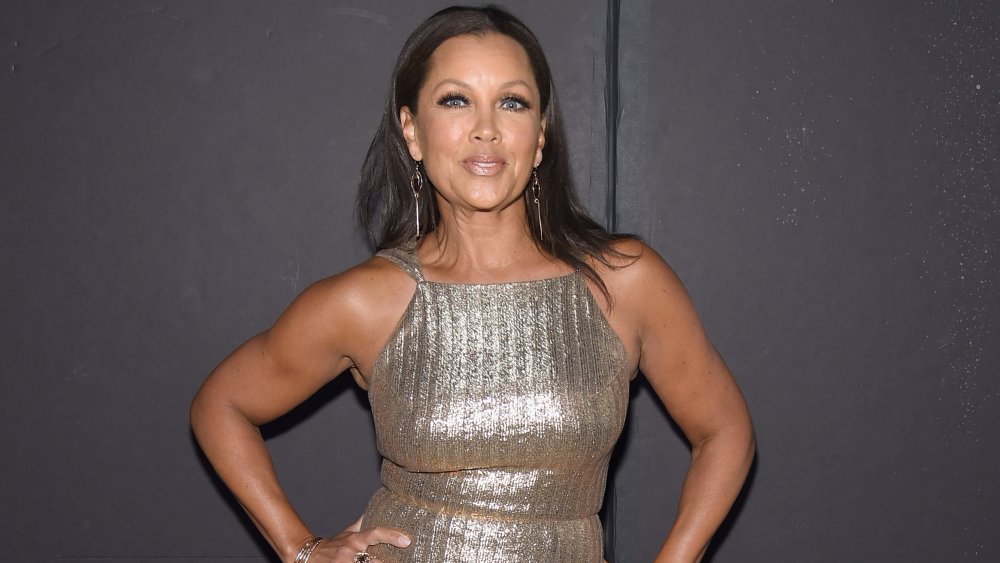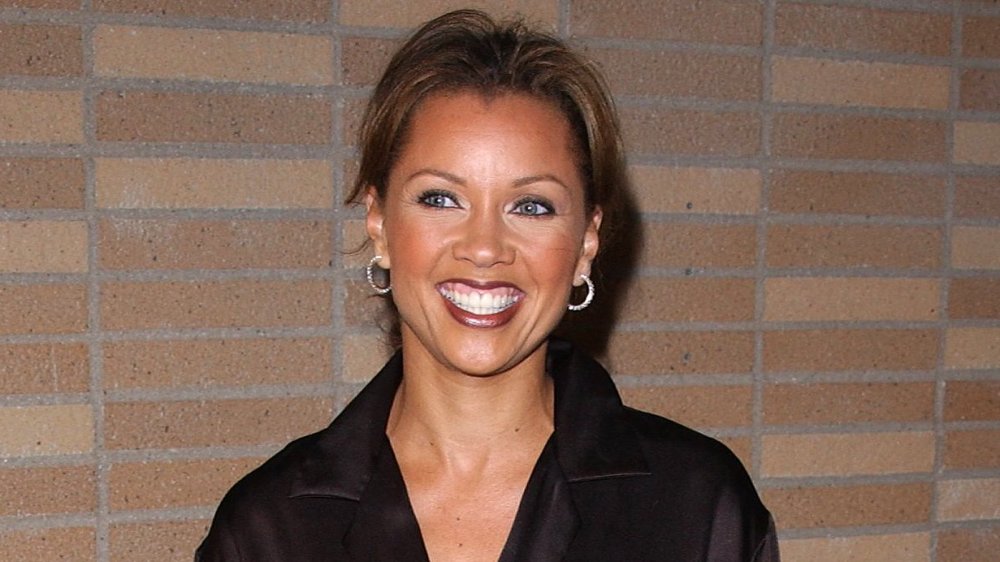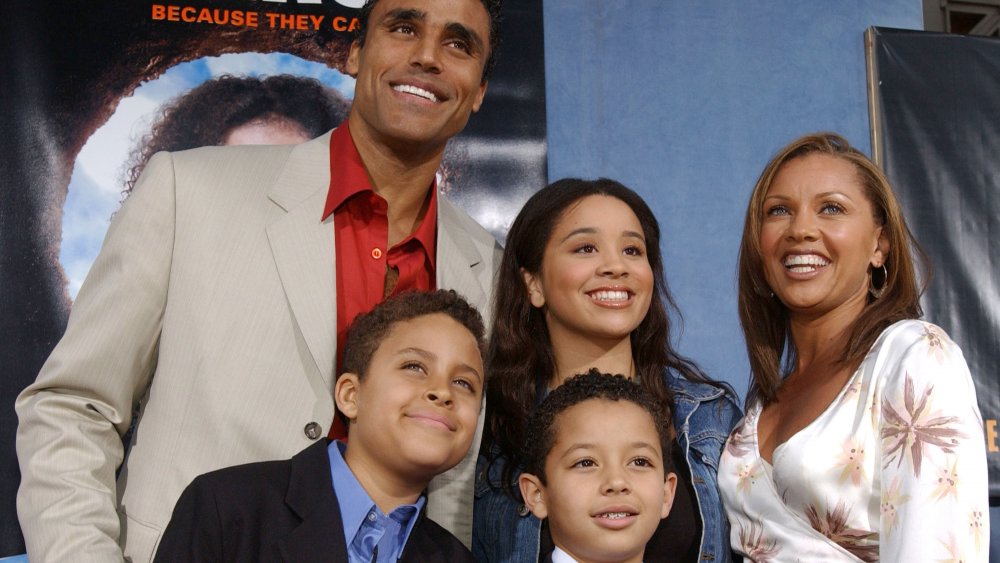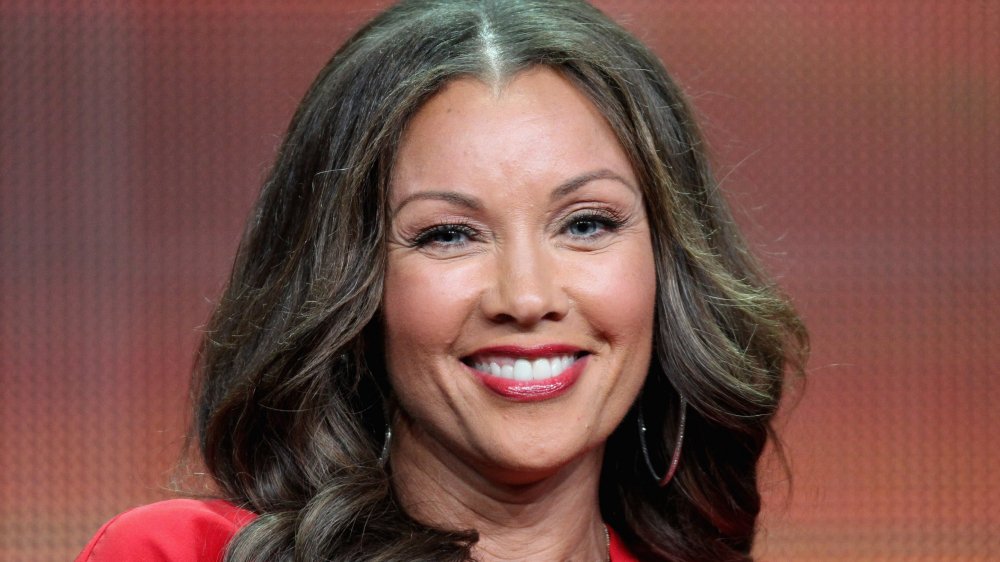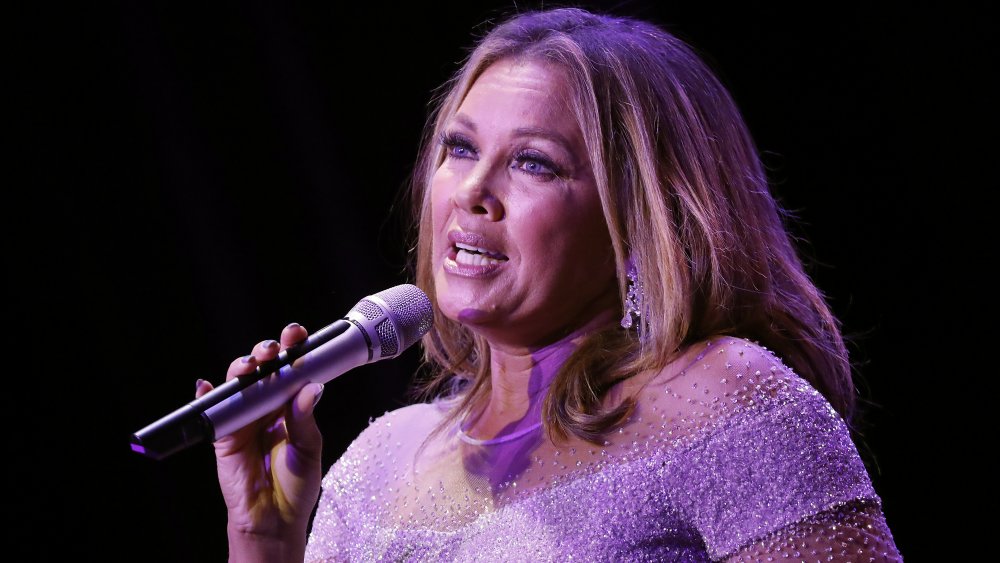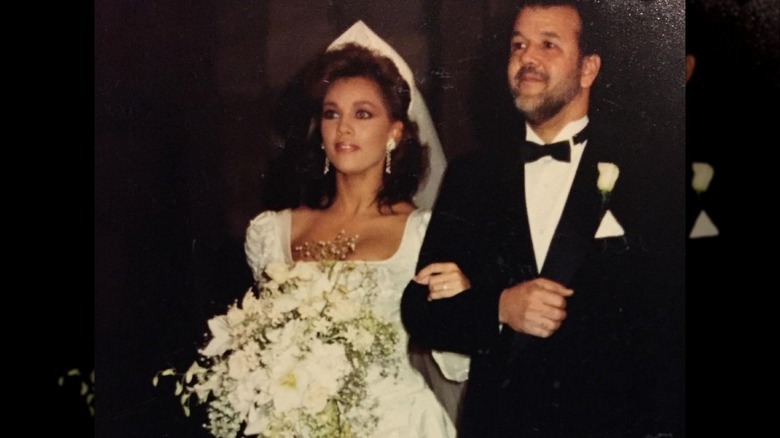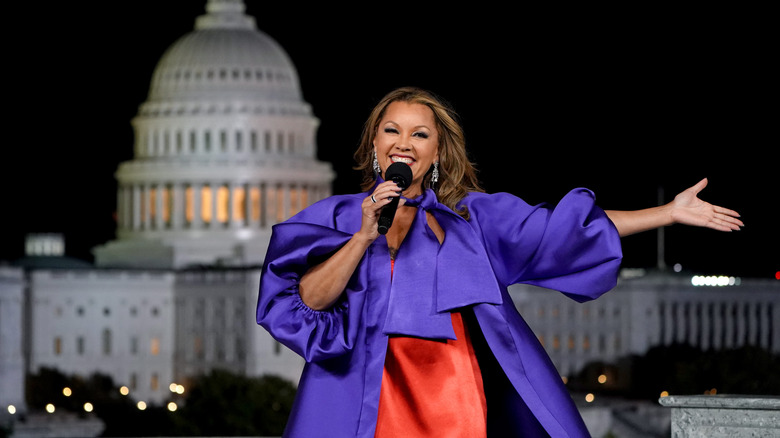The Tragic Real-Life Story Of Vanessa Williams
We may receive a commission on purchases made from links.
Vanessa Williams first climbed her way to success as a no-name college student with big dreams. After winning the 1983 Miss America pageant, becoming the first Black woman to be awarded the title, the aspiring actor and singer's career began. Just one year later, her fame turned to infamy in a scandal that ruined her reputation. But Williams would rise from the ashes and become a celebrated public figure once again, winning back fans with a successful recording career that paved the way for even more success in Hollywood.
Despite her role in one of the Miss America's pageant's biggest controversies, however, Vanessa Williams has largely been redeemed in the public eye — and along the way, she's shared more details of the injustices she faced both in and out of the spotlight. In her 2012 memoir You Have No Idea, Williams blew the lid off oh her own story, revealing even more of the challenges she's weathered over the years. We're breaking it all down for you here with a deep dive into Vanessa Williams' tumultuous timeline of a career.
Vanessa Williams suffered abuse as a child
Vanessa Williams detailed in her 2012 memoir You Have No Idea, which she co-authored with her mother Helen Williams, how she was molested by an 18-year-old female family friend when she was 10 years old. "It happened one night where she told me, 'Come over here,'" Williams told ABC News about the incident. "I didn't know that it was wrong, but I knew that it wasn't right because I wasn't supposed to tell anybody."
In 2014, Williams detailed the incident to Oprah's Master Class, saying she was in fifth grade when she was sexually abused. "She made you want to feel like you were a grown-up," Williams said about her abuser, a "cool girl" who also encouraged her to try cigarettes. "At that young age, having that happen to you in your body, it awakens your sexuality at an age where it shouldn't be awakened," she added. "I think that had that not happened...there wouldn't have been that shame that was always haunting me. It made me more sexually promiscuous."
Vanessa Williams had an abortion when she was in high school
Vanessa Williams had an abortion when she was a senior in high school, writing in her 2012 memoir You Have No Idea that the experience was "awful, terrifying and plain sad." Williams described making an appointment through Planned Parenthood to terminate the pregnancy, and how years later, she still considered herself pro-choice while also identifying as a Catholic. "I'm still pro-choice — every woman should have the right to choose what she wants to do with her body. I'm still a practicing Catholic. Yes, I did confess, and I'm grateful for the opportunity of forgiveness." Williams remembered lying to her mother at the time, telling her she was rehearsing at school when she was actually undergoing the procedure. "I never directly told Mom about my abortion, but I had a sense that she somehow knew," Williams wrote, with her mother, Helen Williams, writing in an aside that she didn't know about the procedure at the time.
Williams eventually had four children, and she told ABC News in 2012 that being pregnant is "the most frightening thing that happens in your life." At the time of her abortion, she wasn't mature enough to handle the gravity of motherhood. "I knew in high school that's something that I was not prepared to do, or fight, or struggle with."
Racist blowback plagued Vanessa Williams' Miss America win
In 1983, Vanessa Williams broke boundaries by becoming the first Black woman to win the Miss America pageant. ”I was chosen because I was qualified for the position,” Williams told the The New York Times shortly after her win, saying that she'd dreamed of appearing on Broadway before competing in the pageant, and observed that the coverage of her victory was more focused on her race than her talents as a performer. ”The fact that I was black was not a factor. I've always had to try harder in my life to achieve things, so this is regular.”
As Williams told People in 1989, she began receiving racist blowback almost immediately after her Miss America win. "I was getting hate mail from white people who hate black people and mail from black people who said, 'You're not really black, because you don't look black,'" she said, describing how naysayers cited her "green eyes and light skin" as the only reason she won. "I didn't like having my accomplishments negated because of the way I looked," she added. "That was harder to live with than anything else."
It wasn't all sashes and handwaving for Vanessa Williams
The blowback that Vanessa Williams experienced after winning the Miss America pageant in 1983 included terrifying threats against her and her family, with authorities getting involved to ensure her safety. Speaking to ABC News in 2015, after the Miss America pageant announced that Williams would return as the pageant's head judge that year, Williams recalled some of the drastic precautions taken on her behalf. "There had been death threats against me," she said, describing a "hotline with the FBI saying, 'She's going to be in Chicago. What should she be aware of?' I had sharpshooters on the top of the buildings when I had my first parade. In one of the parades down South ... usually they have Miss America in a convertible. I had to be inside."
Williams told Extra in 2020 that her parents got involved, coordinating with the FBI to help relieve the burden of the danger she felt. "As a 20-year-old winning overnight and having my world changed, I was on my path to appearances, so I didn't know what I was doing," she said. "My parents were not only the ones receiving the death threats and having a dialogue with the FBI, but trying to allow me to have some kind of safe haven so I wouldn't be terrified."
The scandal that took Vanessa Williams' crown
In one of the most explosive controversies to ever hit the Miss America pageant, Vanessa Williams was forced to forfeit her crown after winning the pageant in 1983, when nude photos she posed for at age 19 for Penthouse became public.
In July 1984, Williams discovered that Penthouse planned to publish photos she took two years earlier while working as a photographer's assistant. Williams told People at the time that the photographer assured her the images, some of which involved "two models pos[ing] nude for silhouettes ... to make different shapes and forms," would never be published. Two years later, following Williams' rise to fame, Penthouse paid the photographer the highest fee in the magazine's history for the images and ran them. Williams later told ABC News that pageant officials gave her 72 hours to resign, after which they would rescind her title.
"It was two drastically different images. ... That was the issue," Williams told ABC News about the controversy. "It was Miss America who's really kind of untouched in that reality. And then there was this woman in a picture, (exactly) the polar opposite of purity ... and I was a normal kid in the middle." Following her resignation, "People would ride by the house and beep things and yell stuff," Williams said. "They took down the sign in (her hometown of) Millwood, New York; "Home of Miss America.'"
Vanessa Williams struggled with body image and mental health issues
Like many women in the public eye, Vanessa Williams struggled with body image issues and self-esteem. The "Dreamin'" singer told Ebony in 1997 that, during stressful times in her marriage to her first husband, Ramon Hervey II, she dealt with the pressure by not eating and overcompensating by working out. "I'd get on the treadmill and do an hour," she said. "When I get nervous, I can't eat. People kept telling me how great I looked. But your clothes are falling off, and you can't face another day. So I was looking my best when I was most miserable."
Williams, who is the proud mom of four children – Melanie Hervey, Jillian Hervey, Devin Hervey, and Sasha Fox — also recalled the pressure she felt to change her body after becoming a mom. "I was asked to come in to meet for Eraser with Arnold Schwarzenegger," she told The Talk in 2019 (via Entertainment Tonight) about her role in the 1996 action movie, which followed the birth of her third child Devin in 1993. "As a singer ... I wasn't used to being judged by how skinny I was. I remember being asked by the producer, 'Well, we'd like you to lose some weight' ... I literally went on a diet. I considered lipo, just to be able to be on screen. ... I did a lot of Pilates and I haven't been that thin since."
The Miss America scandal permanently damaged Vanessa Williams' career
In the years following the scandal that prompted Vanessa Williams to relinquish her Miss America title, Williams became a celebrity pariah. She told ABC News in 2015 that the controversy was no publicity stunt for her. "That's crazy, to think that you can look at a scandal and think that that would be good for your career, where for me, it took every ounce of credibility that I had ... and wiped it out," she said. In a 2016 Town Hall appearance (via the Cape Cod Times), Williams shared how she auditioned for a Broadway show several years after her resignation, only to have the lyricist's wife veto her casting, saying, "Over my dead body will that whore be in my show." Williams described how her status as a "scandalous beauty queen" hurt her Broadway dreams, recalling, "(Her) having that perception of me was when I realized what an obstacle I'd have."
"For me, it seemed like an eternity in which I was the punch line to every late-night monologue...I had to learn how not to take the attacks personally" Williams wrote in her 2012 memoir You Have No Idea, describing how she also lost a fortune along with her crown. "All in all, I lost about two million dollars in endorsements and countless other offers that would have come my way once I finished my reign."
Vanessa Williams weathered two divorces
Vanessa Williams has experienced plenty of loves and losses in her romantic life. In 1987, Williams married her manager Ramon Hervey II, whom she originally met when Hervey was a public relations specialist assisting Williams with the fallout of her Miss America controversy. The couple welcomed three children together — Melanie, Jillian, and Devin – before splitting a decade later, with Williams telling Ebony in 1997, "It was a painful separation, a painful divorce."
Williams married NBA player Rick Fox (seen above with his son Kyle Fox, left, and Williams' children Jillian Hervey and Devin Hervey) in 1999, with the couple welcoming one child together, daughter Sasha. Their five-year marriage ended in 2004, with Williams telling Glamour in 2019 that Fox's career with the Los Angeles Lakers meant he was away from her and her children on the opposite coast. "He was on the road or out in Los Angeles, and after our daughter was born, I was on the East Coast, raising four children and flying across the country every two weeks," Williams said, also citing Fox's age, six years her junior, as another challenging aspect of the relationship.
In 2015, Williams found love again, marrying Jim Skrip, a retired accountant whom she met in a "completely unexpected" encounter during a trip to Egypt. "Now that I'm on my third marriage, I've realized it's key to not expect one person to be able to fulfill every need in your life," Williams told Glamour.
The Miss America organization didn't apologize to Vanessa Williams for decades
In 2015, over 30 years after Vanessa Williams was publicly humiliated and stripped of her Miss America crown, the organization finally apologized for the role its executives played in pressuring her to give up her title. Williams appeared onstage at the Miss America pageant in 2015, standing next to Sam Haskell, the pageant's chief executive. "Though none of us currently in the organization were involved then, on behalf of today's organization, I want to apologize to you and to your mother, Miss Helen Williams," Haskell told Williams onstage (via EW), adding, "I want to apologize for anything that was said or done that made you feel any less than the Miss America you are and the Miss America you always will be."
Williams, who also took the Miss America stage to perform her song "Oh How the Years Go By," thanked Haskell for his words as the crowd applauded. "So unexpected, but so beautiful," she told the audience onstage. "I did the best that I could in my reign as Miss America in 1983 to 1984. ... I'm so honored to be back."
Vanessa Williams fears for her children's safety
In 2020, as Black Lives Matter protests unfolded around the United States, Vanessa Williams spoke out about the fear she felt for the safety of her four Black children. "As a mother of a black son, you have that conversation very early," she told Extra. "When you're walking down the street with a group of your friends, guess who they're gonna pick? If they're all white kids and you're the one black kid, they're gonna identify you. They're gonna remember your face."
Williams also took action following the death of George Floyd, joining forces with other Black entertainment professionals to launch the Black Theatre United advocacy group, which aims to "help protect Black people, Black talent and Black lives of all shapes and orientations in theatre and communities across the country ... through activism in the pursuit of justice and equality for the betterment of all humanity." Of the systemic problems brought to light by Floyd's death and the ensuing protests, Williams told Good Housekeeping that racially-motivated violence as "something that particularly Black mothers are fearful of when they see these incidents arise time and time again...I have a Black son, so it simply needs to be addressed."
Her father's sudden passing rocked her world
In 2006, Vanessa Williams' father, Milton Augustine Williams Jr., died unexpectedly of an acute pancreatic infection. He was 70 and healthy and, as the actor told grief expert David Kessler in 2021, no one saw it coming. "My biggest grief in my life that I had to deal with was my father passing," she shared. "It was devastating because it was such a shock."
Williams recounted how her dad collapsed during his first night on a Bahamas vacation with his wife and was taken to a local hospital where his condition quickly deteriorated. She and her brother, Chris Williams, were able to arrive the next day, then made the decision to medevac Milton to New York, where he died two days later. In a statement, per The New York Times, Vanessa and Chris said they were comforted by the fact that their dad, a music teacher, had a profound impact on so many. "Our father was the true example of a good man," they enthused. "He made a lasting impression on everyone he met and truly changed the lives of all the students he taught."
Her performance of the Black National Anthem was heavily criticized
Vanessa Williams is no stranger to criticism and her career choices were once again torn apart after she performed "Lift Every Voice and Sing" at PBS' "A Capitol Fourth" celebration in 2021. Williams, who was also hosting the event, sang a number of different songs but it was her decision to include the Black National Anthem, first written as a poem in 1900 by NAACP leader James Weldon Johnson, that proved overwhelmingly divisive. While promoting the show, she told the Associated Press she had chosen the track as a special nod to the newly recognized Juneteenth holiday. During the televised Fourth of July bash, she introduced the performance by saying, per Syracuse.com, "I dedicate this to our ancestors, to our new federal holiday Juneteenth, and to all who celebrate freedom."
It's important to note the song did not replace the US National Anthem, which opened the show and was performed by Renée Fleming. However, while some liked Williams' idea, many criticized it as an unnecessarily inflammatory addition. Unsurprisingly, much of the criticism came from the right, but it was still very loud. Political consultant Steve Cortes wrote, "We have one national anthem..." while journalist Carmine Sabia tweeted, "My issue is sing it on Juneteenth. This, singing two National Anthems, I think is another way to divide us." Then there was comedian Tim Young who asked, "What's the Asian national anthem? What's the Native American national anthem? What's the Latino national anthem?"

